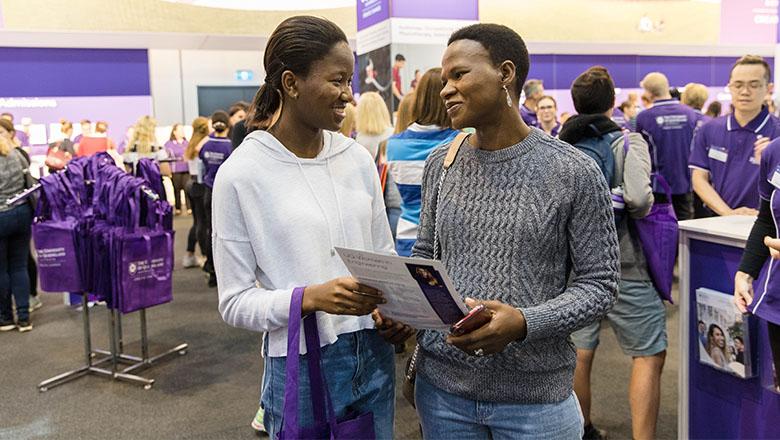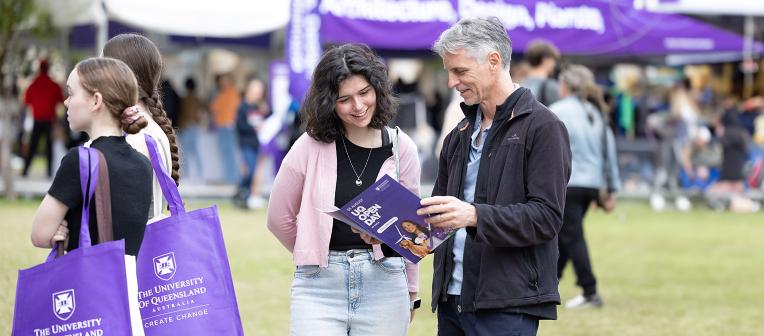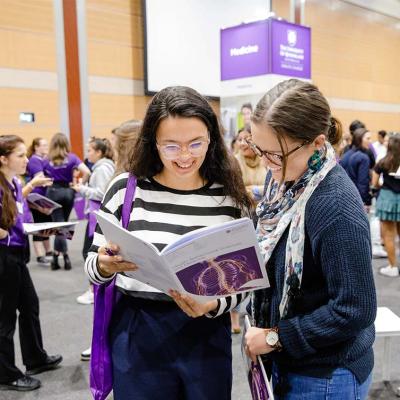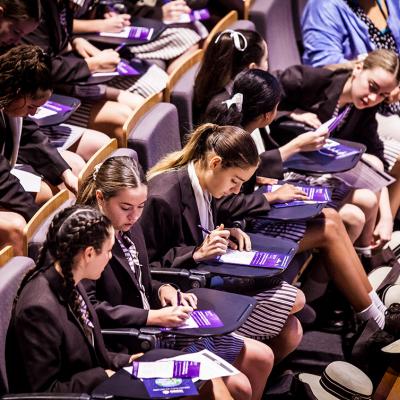Figuring out what to do after Year 12 might be the biggest decision your teen has ever made. You can support them by following these 5 steps.
There are several paths your teen can take after high school, whether it’s attending university, taking a gap year, undertaking an apprenticeship or other training, or getting a full-time job. But how do they know which is the right choice for them? It takes research, discussion and support.
Here’s how you can help your teen decide what to do after graduating high school.
1. Encourage them to explore career options
The path your teen takes through and beyond high school will often depend on the type of career they want to pursue. You can help them explore their career options not only by encouraging them to utilise career counselling at school, but also by attending career expos and events with them and using online resources.
Brisbane career expos and events
Career Pulse is an annual event held in May at UQ’s St Lucia campus for Queensland school groups. It’s an opportunity for high school students to learn about exciting emerging careers from academics and industry professionals. They also get to hear current UQ students explain how their studies are making them career-ready.
Brisbane Careers and Employment Expo and TSXPO are large events with 100+ vendors including a range of employers, training institutions, professional bodies and universities. These are great events for teens to explore what to do after high school, ask questions and get advice.
UQ often holds careers events related to specific subject areas throughout the year. Keep an eye on our events page to see if any may spark your teen’s interest and stay in the loop about our annual Career Pulse event.
Online career resources
UQ’s Career Pulse Hub is an online resource that will inspire your teen to discover potential careers and see how their skills and interests align with them. They can then explore UQ programs that will prepare them for rewarding careers in exciting and evolving fields.
My Future and Your Career are also great resources for teens searching for careers.
Read our dedicated article for more tips on how to help your teenager decide on a career.

2. Discuss what’s important
Having an open and honest conversation with your teen about what they want to prioritise over the next 5 years is also a great way to help them decide what to do after Year 12.
Here are some questions to ask them to get the conversation flowing:
- Do you want to travel, and if so, do you feel it’s important for you to do this soon and potentially take a gap year?
- How soon do you want to start saving money for big purchases like a car, house, or overseas holiday?
- Is it more important to you to begin training to progress your career first, or to begin work in an entry-level job to build upon your savings and then focus on your career later?
- Do the careers you’re interested in pursuing require university-level qualifications?
- Do you feel comfortable moving out of home to attend university or undergo other training?
- If you wish to stay at home, are there tertiary institutions nearby that offer courses you’re interested in studying?
- If you’re considering online learning options to gain a qualification after high school, do you feel confident you can motivate yourself to study remotely?
- Are you interested in meeting new people and making new friends after high school?
Discover more questions you can ask your teen about their future.
3. Be involved in their SET Planning
SET plans are an important part of your teen’s senior schooling. They’re typically drafted in Year 10 and used as a tool to guide your teen through Years 11 and 12, preparing them for their desired pathway after completing high school.
A SET plan will help your teen identify whether they should be aiming to get an ATAR for entry into university, or whether completing their Senior Secondary Certificate (Queensland Certificate of Education, or QCE, for Queensland high schools) will suffice.
Parents are often involved in discussions when teachers are helping students draft their SET plan. Encourage your teen to invest time and effort into creating a SET plan that clearly identifies what they want to achieve in their senior years of high school, to prepare them for what’s next.
SET plans can be changed in Years 11 and 12 if your teen changes their mind about what they want to do after high school. Encourage your teen to review their SET plan once or twice a year to ensure it still reflects their current goals.
Learn more about SET planning and how you can support your teen during this process.

4. Attend open days
Universities, private colleges and other tertiary institutions often hold annual open days where prospective students can attend campus to get an idea of what it would be like to study there. Open days typically occur in July and August, but this can differ depending on the institution.
Find university open day dates in Queensland and Northern NSW.
At open days, you and your teen will have the chance to delve deeper into study areas and program offerings, ask questions, and speak with current students about university life. It’s a good way to determine if the campus ‘feels right’ – part of knowing whether a tertiary institution is right for your teen will be whether they can envision themselves studying there.
There usually aren’t age restrictions on attendees to open days, and students from Years 10-12 often go to these events. You can check the event specifics on the institution’s website. If your teen is keen to begin exploring their tertiary education options early, attending open day events from Year 10 onwards can help them decide what to do after high school.
Get tips on how to support your teen at a university open day.
5. Look into scholarships
The cost of studying and moving can often impact the path your teen takes after graduating high school. However, if they’re interested in pursuing tertiary education, you can avoid money becoming a barrier to their aspirations by securing a scholarship. Many tertiary education providers offer a range of scholarships for a variety of students. Scholarships are not solely for high school students who demonstrate high grades, and they can do more than cover tuition fees.
There are lots of scholarships out there that can help with moving costs, accommodation, and expenses associated with study equipment like a laptop or specific software. Scholarships are also for students from a wide variety of backgrounds, including those experiencing financial hardship or living with a disability, culturally and linguistically diverse people, and those from rural or remote areas.
If your teen has shown interest in a few tertiary education providers, head to their websites and see what scholarships they offer. Your teen might be eligible to apply for more scholarships than you thought.
It’s also worth noting that the Australian Government provides several financial assistance programs for people commencing tertiary study.
UQ has hundreds of scholarships for high school leavers, with some valued up to $60,000. Browse our scholarships to see the financial support your teen could receive to study at UQ.
Looking for more advice on how to help your teen prepare for their future? Read up on the good habits they can develop during high school, which will help them thrive as an adult.





